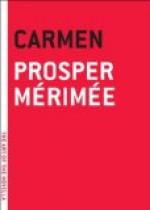“‘I belong to Elizondo,’ I answered in Basque, very much affected by the sound of my own language.
“‘I come from Etchalar,’ said she (that’s a district about four hours’ journey from my home). ’I was carried off to Seville by the gipsies. I was working in the factory to earn enough money to take me back to Navarre, to my poor old mother, who has no support in the world but me, besides her little barratcea* with twenty cider-apple trees in it. Ah! if I were only back in my own country, looking up at the white mountains! I have been insulted here, because I don’t belong to this land of rogues and sellers of rotten oranges; and those hussies are all banded together against me, because I told them that not all their Seville jacques,** and all their knives, would frighten an honest lad from our country, with his blue cap and his maquila! Good comrade, won’t you do anything to help your own countrywoman?’
* Field, garden.
** Bravos, boasters.
“She was lying then, sir, as she has always lied. I don’t know that that girl ever spoke a word of truth in her life, but when she did speak, I believed her—I couldn’t help myself. She mangled her Basque words, and I believed she came from Navarre. But her eyes and her mouth and her skin were enough to prove she was a gipsy. I was mad, I paid no more attention to anything, I thought to myself that if the Spaniards had dared to speak evil of my country, I would have slashed their faces just as she had slashed her comrade’s. In short, I was like a drunken man, I was beginning to say foolish things, and I was very near doing them.
“’If I were to give you a push and you tumbled down, good fellow-countryman,’ she began again in Basque, ’those two Castilian recruits wouldn’t be able to keep me back.’
“Faith, I forgot my orders, I forgot everything, and I said to her, ’Well, then, my friend, girl of my country, try it, and may our Lady of the Mountain help you through.’
“Just at that moment we were passing one of the many narrow lanes one sees in Seville. All at once Carmen turned and struck me in the chest with her fist. I tumbled backward, purposely. With a bound she sprang over me, and ran off, showing us a pair of legs! People talk about a pair of Basque legs! but hers were far better—as fleet as they were well-turned. As for me, I picked myself up at once, but I stuck out my lance* crossways and barred the street, so that my comrades were checked at the very first moment of pursuit. Then I started to run myself, and they after me—but how were we to catch her? There was no fear of that, what with our spurs, our swords, and our lances.
* All Spanish cavalry soldiers carry lances.
“In less time than I have taken to tell you the story the prisoner had disappeared. And besides, every gossip in the quarter covered her flight, poked scorn at us, and pointed us in the wrong direction. After a good deal of marching and countermarching, we had to go back to the guard-room without a receipt from the governor of the jail.




